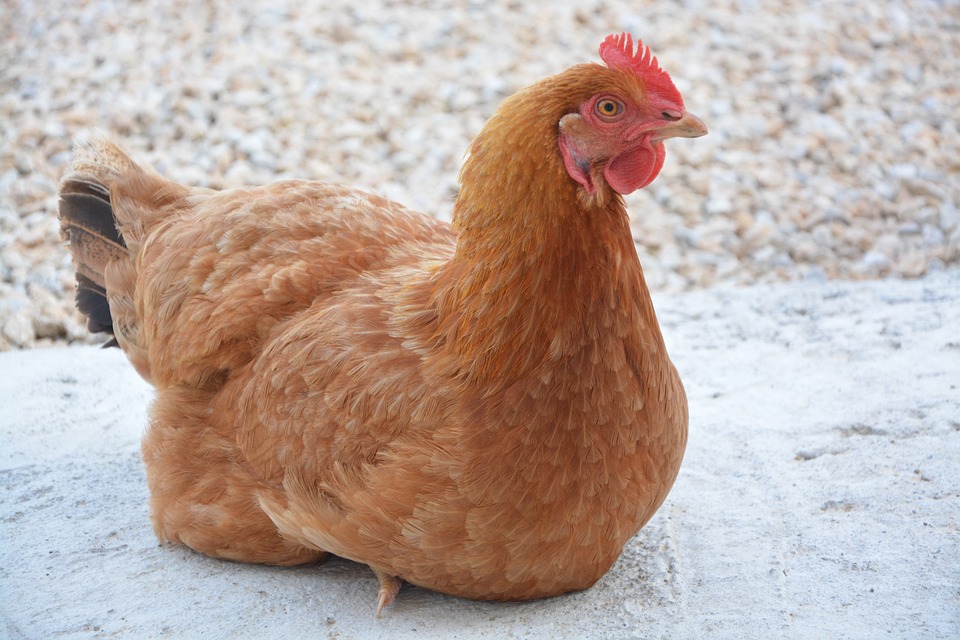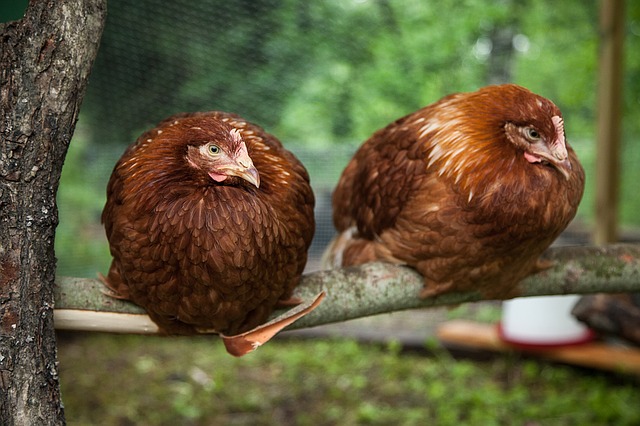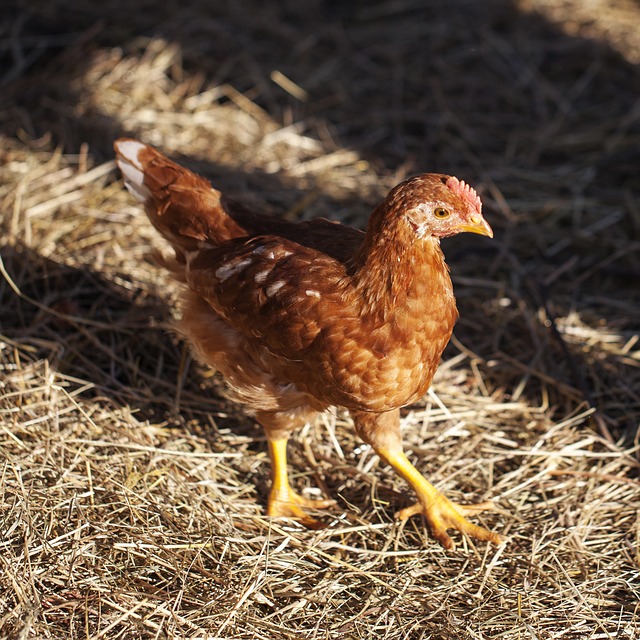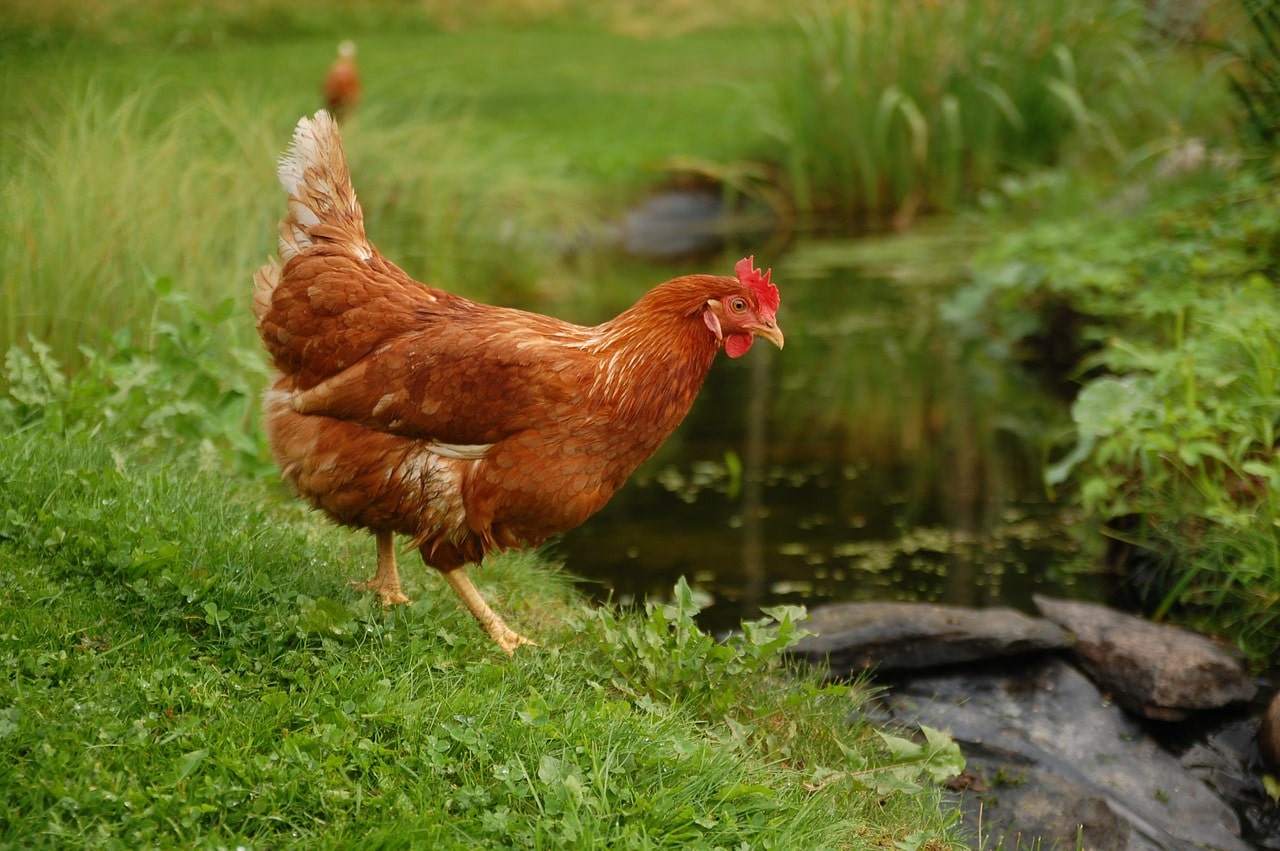Whether you are raising chickens for commercial egg production or simply want to diversify your flock with an excellent egg-producing chicken breed, the Golden Comet might be the right choice for you.
A gorgeous, golden-colored chicken that is a hybrid between the New Hampshire rooster and White Rock hen, this chicken is sure to offer you everything you need in your backyard flock.
Intrigued? You should be!
This chicken was designed for commercial farming but has become a fixture in backyards and small chicken coops all over the world.
Today, it’s one of the most popular types of hens.
If you’re ready to learn more about the Golden Comet chicken breed, keep reading – and make sure you place an order at your local hatchery ASAP for one of these cute, productive birds.
History of the Golden Comet Breed
Golden Comet chickens are known as sex-linked chickens.
Sex-link birds are often considered to be not actual breeds. They are crossbreeds, or hybrids.
The science is simple. If you cross a purebred chicken with one of its own kind, the resulting chicks will look more or less the same as their parents.
You typically cannot sex most chicken breeds at birth (unless, of course, you have the skills, tools, and background to do so – an endeavor that most people simply do not undertake).
Golden Comets and other sex-link birds, however, can be sexed immediately after hatching.
This is incredibly useful for hatcheries because Golden Comet hens can be kept for laying.
If you live somewhere in which roosters are not allowed, a sex link chicken breed is the perfect choice – you won’t have to worry about violating any zoning laws with all that crowing.
As we mentioned, Golden Comets are hybrids.
This means that they are bred between a New Hampshire rooster and a White Rock hen.
This pairing is very specific.
While there are other types of red sex link chickens available, the Golden Comet is the only one that results from this cross.
Other common types of red sex link birds include:
- Red Star
- Golden Buff
- Gold Sex Link
- Cinnamon Queen
These names are sometimes used interchangeably, too.
Other red sex-link birds can be produced from breeds like Silver Laced Wyandotte, Delawares, and Rhode Island Whites.
You might consider other red sex-links like Isa Browns or Red Shavers.
In addition to red sex-link chickens, there are other common varieties of sex link birds, too.
Golden Comet hens are known for being good egg layers, with most producing more than 300 eggs per year depending on the quality of feed and care.
Egg color can vary, with brown being the most common but blue-green eggs possible, too.
Besides red sex-link birds, black sex-links are also common.
These are produced as crosses between unique hybrid strains of Rhode Island Red roosters or any non-white or non-barred rooster as well as Barred Rock hens.
Golden Comet Appearance

There is no standard set for this bird, which is a hybrid chicken and therefore not subjected to any guidelines by the American Poultry Association.
However, the Golden Comet is usually a light to medium brownish-red color. Sometimes it may look more golden in appearance, especially when the sun hits its feathers just right.
Golden Comet chickens can also have some vivid white in their feathers, too, making them look paler than they actually are.
These chickens are small, with females usually only reaching four pounds and males growing up to six.
Each bird will have a single upright comb that is a deep red in color along with a brownish-yellow beak and yellow eyes.
The legs will also be yellow, and each chicken will have four toes per foot.
The chicken has a body that is shaped like an inverted triangle. The tail is held high and nearly perpendicular to the body.
A Golden Comet chick looks very similar to chicks from other breeds. They have yellow fluffy feathers with a rust-colored tint to them. The older the Golden Comet chicks become, the more they develop the adult characteristics.
Personality

The Golden Comet is one of the friendliest chicken breeds you can raise.
It is laid back and curious, and while it will occasionally explore areas where it shouldn’t be hanging out, it otherwise is quite docile and will stay where you have it penned.
Golden Comets are super energetic and quick to mature.
They will actively pursue their own forage, and while they aren’t known for being flighty, they will occasionally hop over the fence you’ve built.
Because they are relatively lightweight, this is easy for them to do – you may need to use a covered run or clip their wings in order to keep them contained.
This chicken doesn’t mind being picked up, and there are some people who say that their Golden Comets prefer the company of people over other chickens.
They are great chicken for owners with small children, as they won’t chase or become aggressive in any way.
Golden Comets also are not known to fight.
They are often viewed as the “peacemakers” of the flock, moving away from fighting chickens and staying out of pecking order-related disputes.
These gentle Golden Comet chickens dislike fighting and will keep themselves out of trouble.
While Golden Comets are often raised as egg producers, they are commonly kept as family pets, too.
They do well when mixed with similarly non-aggressive breeds (particularly those that are quite calm).
While they won’t fight, even with other, more volatile chicken breeds, keeping them with peaceful chickens can help minimize stress and maximize their laying.
Some breeds to consider keeping with your Golden Comets include:
- Other sex-link chickens
- Cochins
- Faverolles
- Plymouth Rocks
- Orpingtons
- Barred Rocks
- New Hampshire Reds
- Rhode Island Reds
Is the Golden Comet Chicken a Good Layer?
If you’re wondering whether the Golden Comet chicken is a good layer, you’ve come to the right place.
Golden Comet chickens were designed to be egg-laying machines, and you’ll be hard-pressed to find a better egg producer than this one.
It will produce up to six medium to large brown eggs each week – or 330 per year.
You’ll get just about one egg each and every day from these chickens. That makes them one of the best chickens for egg laying.
The other aspect of this chicken’s personality that is truly remarkable is that it starts laying much earlier than other breeds.
Here are some common laying ages among the most popular egg producing chicken breeds:
- Rhode Island Red: 18-20 weeks
- Sussex: 20 weeks
- White Leghorn: 16-17 weeks
- Plymouth Rock: 18-20 weeks
- Ancona: 20 weeks
- Barnevelder: 18-20 weeks
- Hamburg: 20 weeks
- Maran: 30 weeks
- Buff Orpington: 24 weeks
In comparison, the Golden Comet starts laying at 16 weeks – just four months of age.
As pullets, these eggs will be tiny, but they will increase and reach full size in just a couple of weeks.
In fact, you may find that your Golden Comets seem somewhat surprised by the appearance of eggs.
They might lay in odd locations at first, not knowing what they are doing at such a young age.
If you have this problem, you may want to encourage your Golden Comets to lay in the nest boxes you’ve built by doing the following:
- Putting “decoy” eggs like false eggs or golf balls in the nest boxes
- Providing plenty of fresh, clean bedding to make the nest boxes comfortable
- Hanging curtains over the nest boxes for added privacy
- Making sure all nest boxes are free from mites, predators, or other disturbances
- Removing laid eggs from your nest boxes more frequently to prevent confusion, egg-eating, and egg breakage
You’ll know your Golden Comet is ready to start laying eggs when it exhibits the following characteristics:
- Pink waddle and comb become bright red
- Food and water consumption increase
- Golden Comet hens begin to “squat” when you approach
- Hens start to explore isolated, darkened areas of the coop (like your nest boxes)
In addition, this chicken is productive for quite some time when you consider how early and how prolifically it starts to lay.
Golden Comets can stay productive for about two years, after which time the egg production will decline.
Golden Comet chickens are not known for going broody.
This is a major benefit when you are raising chickens for egg production, since broodiness can put a damper on your productivity for quite a few weeks.
Suggested Article: 20 Most Productive Egg Laying Chicken Breeds
Is the Golden Comet Chicken Good for Meat Production?
Golden Comet chickens could be consumed for meat if you needed to cull some non-productive layers in their advancing age.
However, they won’t be the best meat bird around. These chickens are quite small, rarely reaching five or six pounds, so you won’t get a lot of meat from the carcass.
In addition, by the time these chickens might be considered for the dinner table, they will be a couple of years old.
This is long past the recommended age for butchering chickens, so we don’t recommend raising or using Golden Comets for meat production in any way.
You’ll make up for the loss of meat production with all of the eggs you get, though!
Does the Golden Comet Chicken Have Any Breed-Related Health Problems?
Because the Golden Comet is a hybrid chicken, it has been bred specifically to avoid a majority of breed-related health conditions.
Here’s an overview of health concerns to be aware of:
- Lice, mites, and worms
- Short lifespan
- Egg production concerns
Lice, Mites, and Worms
As with all chickens, you will need to keep an eye out for certain problems like lice, mites, and worms with a Golden Comet.
These can easily be avoided by maintaining a clean, hygienic coop and by treating with natural parasiticides from time to time.
Dust baths are helpful, too!
Short Lifespan
Unfortunately, Golden Comet chickens were bred to be highly productive. As with all chickens designed for this purpose, they usually have a short lifespan.
These chickens won’t live to be six, seven, or eight years old as they might with other less aggressive layers – instead, your Golden Comet chicken will likely only reach four or five years of age.
Egg Production Concerns
Similarly, these high production birds can succumb to some issues related to high egg production, too.
These issues include egg yolk peritonitis, reproductive tumors, and other similar reproductive problems.
Monitoring your flock is your best shot at preventing these issues – often, if you can catch an egg-related issue early on, you will be able to effectively treat it.
You should also add calcium to your hens’ diet to ensure they are laying healthy, passable eggs.
Ideal Environment for a Golden Comet Chicken
Golden Comet chickens are tolerant of a wide variety of environmental chickens.
Since they aren’t overly large, they do well in the heat as long as they have plenty of shade and water.
They can also tolerate the cold quite well, as they have a decent layer of downy feathers.
However, as with all chickens of single combs, you will need to keep an eye out for frostbite on the combs.
Golden Comets aren’t large, so they won’t take up much space in your coop. In addition, since they aren’t prone to fighting, they do well in confinement.
Even in the winter months, you won’t have to worry about your chickens feeling “cooped up” – they will tolerate confinement with grace and ease.
However, you might want to add a light to your coop during the cold, short days to help stimulate continued laying.
It’s also a good idea to bed your coop heavily in straw, as your Golden Comets might choose to sleep in the straw instead of roosting to protect their legs and feet.
Golden Comet chickens are also great candidates for small backyards. Since they take up so little space, they won’t need a large coop.
They also make very little noise, particularly because Golden Comet chickens are usually only raised as hens (no roosters allowed).
If you live somewhere that has restrictions on roosters, the Golden Comet chicken is the perfect breed.
How to Raise a Golden Comet Chicken

Many people assume that Golden Comet chickens will lay well without any additional work on the part of the chicken-keeper.
While these birds have the genetics needed to produce a large amount of eggs, you need to do your part as well.
Feeding
You should make sure your birds have plenty of clean, fresh water and good nutrition.
Feeding a pellet that is specifically for layers – which will include added calcium – is recommended, but you may still need to supplement with additional calcium in the form of oysters hell, too.
You should also feel free to add other foods to your Golden Comet’s diet, too.
Egg production can sometimes drop off unexpectedly in these birds, which is viewed by many chicken keepers as a disadvantage.
Setting up a Coop
When setting up your coop for Golden Comets, you should set the roost at about two to four feet off the ground. Because Golden Comet chickens aren’t particularly tall, this will give them plenty of room to get up and onto the roost.
Each chicken should get at least four square feet of coop space. However, it can’t hurt to give them extra space if you’re able.
Make sure you have lots of nest boxes – at least one for every three to four birds (one per bird would be even better, but most people don’t have this much space).
Remember, your Golden Comets will be laying almost every day – although these chickens aren’t known to fight, you’ll want to give them plenty of room in the nest boxes.
These nest boxes should be filled with plenty of bedding and should be easy to clean.
This will help you avoid egg breakage or your Golden Comet hens choosing to lay eggs in an alternative area.
Benefits of Raising a Golden Comet Chicken
Where do we start?
There are so many benefits associated with raising a Golden Comet chicken, most of which we’ve already mentioned.
These chickens are prolific egg layers, so if you want a breed that will lay you tons of eggs on a regular basis – and start laying early – then this chicken is for you.
It’s also a non-aggressive chicken breed, getting along well with other members of the flock as well as your non-chicken residents.
Golden Comets are adaptable to just about any climate.
Even if you live in a cold area, where your Golden Comet might be prone to frostbite in its comb, you can raise these birds.
Just make sure you check each bird every day when there is extreme cold to make sure there is no frostbite on the comb.
You can also reduce the humidity level in your coop to reduce condensation build-up in the comb.
Here are some of the other reasons you should raise a Golden Comet chicken:
- Peaceful disposition
- Can be introduced to an existing flock of other chicken breeds (no pecking order concerns)
- Minimal health problems
- Small size helps them tolerate confinement well
- Good free rangers
- Gorgeous appearance
- Does well with other pets and people
Challenges of Raising a Golden Comet Chicken
When choosing the right chickens for your coop, it’s always good to consider the positives and negatives. All breeds will present come challenges, so it’s important to acknowledge those potential concerns before bringing more chickens home.
The major downside of raising Golden Comet chickens is that it can be hard to produce successive lines of this breed.
Since Golden Comets rarely go broody, you aren’t likely to see any chicks hatching from eggs unless you incubate them yourself.
If you want to incubate eggs in your incubator, you can – and you’ll experience a decent hatch rate.
However, you should not place a Golden Comet egg in the incubator assuming that you will get a Golden Comet chick.
The resulting offspring will be cross-breeds whose genetic characteristics are watered down from those of the parents.
To truly maintain your flock, you will need to breed White Rocks with New Hampshires – meaning you will need to maintain a separate breeding flock just for this purpose.
This drop can almost always be linked to poor nutrition or a change in the seasons.
Make sure your Golden Comets have plenty of sunlight or artificial lighting, and feed them plenty of fat, protein, and carbohydrates.
Consider supplementing with fresh vegetables, too, for additional minerals and vitamins.
Natural Curiosity
Finally, Golden Comet chickens are naturally curious.
This can be seen as a benefit or a disadvantage. These birds will enjoy opportunities to free-range on their own, often finding most of their own food.
They can make quick work of tilling your garden for you, too!
However, on the flip side, the curious, fearless demeanor of this chicken means that it may sometimes get itself into trouble.
You will want to supervise this bird while it is free-ranging or allow it to do so inside an enclosed run or chicken tractor.
These birds aren’t known for being terrible flighty, but they are lightweight so it won’t be difficult for them to get enough momentum to get off the ground, into the air, and over a fence.
Once out, these birds may explore areas they shouldn’t, tearing up flower beds or investigating the neighbor’s lawn.
While they won’t usually do too much damage, it’s important that you keep this in mind, as predators will often take advantage of a wandering chicken out on its own.
Frequently Asked Questions
Asking questions and doing research before getting new chickens is a great way to make sure you’re prepared. Here are some commonly asked questions.
Are Golden Comets Cold Hardy?
Yes, Golden Comet chickens can handle the cold well. They have a thick layer of downy feathers to keep them warm. However, you should never expose chickens to extreme cold more than needed. A coop heater is a great way to protect chickens of all breeds in the winter.
Are Golden Comet Chickens Good with Children?
Yes, Golden Comets are great for all ages. They rarely show aggressive behaviors, and they’re usually friendly and calm. Most of them don’t mind being held or picked up either. So, some keepers consider them pets more than livestock.
Can Golden Comet Chickens Fly?
Yes, Golden Comets are capable of flying. However, it’s rare to see them take flight. So, it’s unlikely that you’ll see them try to fly away unless they’re trying to escape a predator or another threat.
Should You Raise the Golden Comet Chicken?
When you think about raising a backyard chicken flock, what comes to mind?
Whether it’s a gorgeous basket of eggs every single morning or a happy-go-lucky hen that runs up to you every time you enter the chicken run, then the Golden Comet chicken might be for you.
This bird lays early and often, making it the star of the egg producer world.
It will provide you with plenty of large, delicious eggs – and will have a charming personality to accompany that production.
This chicken is great with kids, making it the perfect candidate for a 4H project or even someone seeking a more docile chicken breed.
For its output, the Golden Comet chicken takes up very little space. It’s the ideal candidate for a small backyard or for a large scale commercial egg farm.
If you’re in the market for the perfect chicken breed, you’ve found it – the Golden Comet chicken is one of the best egg-laying chicken breeds you can raise.
